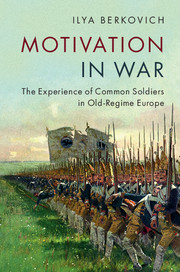Refine search
Actions for selected content:
15418 results in Military history
Maps
-
- Book:
- Soldiers and Gentlemen
- Published online:
- 07 September 2017
- Print publication:
- 14 February 2017, pp xiii-xiii
-
- Chapter
- Export citation
Tables
-
- Book:
- Soldiers and Gentlemen
- Published online:
- 07 September 2017
- Print publication:
- 14 February 2017, pp xiv-xiv
-
- Chapter
- Export citation
Acknowledgements
-
- Book:
- Soldiers and Gentlemen
- Published online:
- 07 September 2017
- Print publication:
- 14 February 2017, pp xvii-xix
-
- Chapter
- Export citation
Chapter 1 - ‘He Knows How to Make Soldiers’
-
- Book:
- Soldiers and Gentlemen
- Published online:
- 07 September 2017
- Print publication:
- 14 February 2017, pp 12-38
-
- Chapter
- Export citation
Dedication
-
- Book:
- Soldiers and Gentlemen
- Published online:
- 07 September 2017
- Print publication:
- 14 February 2017, pp vii-viii
-
- Chapter
- Export citation
Abbreviations
-
- Book:
- Soldiers and Gentlemen
- Published online:
- 07 September 2017
- Print publication:
- 14 February 2017, pp xxi-xxii
-
- Chapter
- Export citation
Chapter 3 - ‘No Shortage of Senior Officers’
-
- Book:
- Soldiers and Gentlemen
- Published online:
- 07 September 2017
- Print publication:
- 14 February 2017, pp 63-87
-
- Chapter
- Export citation
Figures
-
- Book:
- Soldiers and Gentlemen
- Published online:
- 07 September 2017
- Print publication:
- 14 February 2017, pp x-xii
-
- Chapter
- Export citation
Copyright page
-
- Book:
- Soldiers and Gentlemen
- Published online:
- 07 September 2017
- Print publication:
- 14 February 2017, pp iv-iv
-
- Chapter
- Export citation
Index
-
- Book:
- Soldiers and Gentlemen
- Published online:
- 07 September 2017
- Print publication:
- 14 February 2017, pp 293-303
-
- Chapter
- Export citation
Measurements
-
- Book:
- Soldiers and Gentlemen
- Published online:
- 07 September 2017
- Print publication:
- 14 February 2017, pp xx-xx
-
- Chapter
- Export citation
Appendix B - Statistics
-
- Book:
- Soldiers and Gentlemen
- Published online:
- 07 September 2017
- Print publication:
- 14 February 2017, pp 221-225
-
- Chapter
- Export citation
Preface
-
- Book:
- Soldiers and Gentlemen
- Published online:
- 07 September 2017
- Print publication:
- 14 February 2017, pp xv-xvi
-
- Chapter
- Export citation
Chapter 5 - ‘The Hardest Task in the Army’
-
- Book:
- Soldiers and Gentlemen
- Published online:
- 07 September 2017
- Print publication:
- 14 February 2017, pp 119-142
-
- Chapter
- Export citation
Appendix A - COs’ Periods of Command
-
- Book:
- Soldiers and Gentlemen
- Published online:
- 07 September 2017
- Print publication:
- 14 February 2017, pp 211-220
-
- Chapter
- Export citation

Motivation in War
- The Experience of Common Soldiers in Old-Regime Europe
-
- Published online:
- 09 February 2017
- Print publication:
- 16 January 2017
6 - Nation and Trans-nation
-
- Book:
- Latin America and the First World War
- Published online:
- 09 March 2017
- Print publication:
- 09 February 2017, pp 226-255
-
- Chapter
- Export citation
5 - The Demise of a World
-
- Book:
- Latin America and the First World War
- Published online:
- 09 March 2017
- Print publication:
- 09 February 2017, pp 195-225
-
- Chapter
- Export citation
Contents
-
- Book:
- Latin America and the First World War
- Published online:
- 09 March 2017
- Print publication:
- 09 February 2017, pp vii-vii
-
- Chapter
- Export citation
Epilogue: The Global Legacy of the World War
-
- Book:
- Latin America and the First World War
- Published online:
- 09 March 2017
- Print publication:
- 09 February 2017, pp 256-262
-
- Chapter
- Export citation
